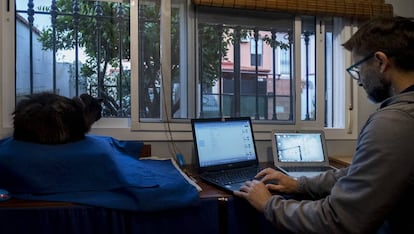Will the office become a thing of the past in Spain?
As the coronavirus lockdown eases, experts predict that capacity in the workplace will be reduced by 30% to 50%, with staff combining teleworking with on-site shifts


The coronavirus crisis has forced the issue of teleworking in Spain. In a bid to slow the outbreak, millions of people were sent from their offices to work at home. Now, as the lockdown eases, companies are already preparing for the future despite the lack of specific regulations. Experts, however, are convinced that it will take a long time for the office to return to the way it was before the pandemic, if indeed it ever does. In their opinion, workers will return to the office in stages, and by September at the earliest, depending on the health crisis.
Consultants and architectural firms are currently drawing up protocols on the return of the workforce. They agree that stages with concrete measures must be established to allow the gradual re-incorporation of employees. “Almost all our clients are analyzing the return to the office and how to guarantee the distance between workers,” says Alejandro Pociña, president of furniture company Steelcase in Spain. “We are helping them to come up with a structured strategy for the short, medium and long term, although nobody knows how long this will last.”
People want to come back to the office – not full time, but to see each other and be part of a group and a projectÓscar Fernández, from real estate company Cushman & Wakefield
As everything depends on the evolution of the virus, there is no date for the phases, but there are guidelines. “The plans we are preparing reduce capacity by 35% to 50%,” says Guzmán de Yarza, head of property investor JLL’s workplace strategy for Europe, the Middle East and Africa. “Offices are going to work strangely – the first to return will be the essential employees, normally those at higher levels.” After that, shifts will be organized.
Workspaces will also be highly regulated. “In the transition phase, we are going to have new rules,” says Iñaki Lozano, founder and executive director of the Business Innovation Consultancy Group (BICG). “What we’ll have to do is establish distances, seating limits, ways of moving around and easier access.”
To a degree, these changes have already taken place in sectors such as banking, which has remained operational during the pandemic. “We have a disinfection protocol when we enter to put on our mask and gloves,” says Pedro Martínez, an employee at a bank in the southern city of Mallorca. The staff alternates on a weekly basis so that only three people are in the office at any one time. And there is no question of having a coffee with a colleague in the middle of the morning. Now breaks are taken alone in the manager’s office – the manager has moved to a desk in the main area to avoid two people being in his small office at the same time.
Office rules
“The buildings and offices will have signs with diagrams and instructions explaining how to use the space and how to move around inside,” says Leyre Octavio de Toledo, executive director of architecture at property company Savills Aguirre Newman. Large-scale refurbishment in the face of what promises to be the steepest economic recession in recent history has been ruled out for the moment. “No one is going to get involved in big projects,” says Óscar Fernández, director of business development at real estate company Cushman & Wakefield. It’s more about adapting existing spaces to the new regulations.”
But there is no sense of urgency. “Teleworking has maintained productivity in the office sector,” says De Yarza. “It has been shown that similar levels [of productivity] can be achieved so managers are not in a hurry.”

Curiously, it is often the workers themselves who are most keen to get back to their desks. The workspace design and manufacturing company Actiu recently conducted a survey involving 400 professionals. Only 16% said they would prefer to continue to work from home. A similar conclusion was reached by surveys carried out by Cushman & Wakefield.
Fernández admits to being “surprised” by the results. “People want to come back to the office – not full time, but to see each other and be part of a group and a project. When teleworking happens on one-off occasions, you still get that feeling, but that is not the case in this situation.”
Working remotely will definitely be more common than before the pandemic, when, according to Lozano, there “were lots of cultural barriers.” This will make working in an office a more attractive option, says Pociña. “[Offices] will continue to be a fundamental business asset,” he explains. All experts consulted agree that technology will play a key role, especially developments that help reduce contact and facilitate mobility and access.
A September start
Experts agree that workers will return to the office in stages, as the central government has recommended. José María Álvarez, the president of the Spanish Association of Offices (AEO), believes that teleworking will continue until “at least the end of summer.” A hasty return to the office could endanger the health of workers.
In the absence of an effective treatment against Covid-19, businesses will need to make a considerable investment in redesigning the available space if they want to return to the same number of in-house staff as before the crisis. “By the fall or the end of the year, companies will start coming up with a more stable plan, depending on the information available to them,” says Álvarez.

Tomás Higuero, managing director of air purification and ventilation company Aire Limpio, believes this could take longer. “It is logical that in the short term – January or February 2021 – or until there is a vaccine, teleworking will prevail,” he says. However, he also believes that office culture will gradually return with the office as “the heart of the operation” even as remote working continues.
Elevators
The return to the office is fraught with problems. In addition to space and mobility and health and safety protocols, “elevators are critical,” according to Álvarez.
Another executive, who prefers to remain anonymous, explains the magnitude of the problem: at his firm’s headquarters in New York they have calculated if elevator capacity was restricted, it would take the whole working day to get everyone to their desks.
“Maybe we should consider walking up the first floors,” says Fernández. This idea is endorsed by Octavio de Toledo, of property consultancy firm Savills Aguirre Newman, who adds that the lines for the elevator will need to be controlled and use restricted.
Solutions range from basic to sophisticated – Octavio de Toledo mentions that “in some cases, we will see elevators being automatically disinfected as they empty out by means of ozone and ultraviolet rays.”
But the investment needed for the more sophisticated solutions is something of a stumbling block. As Álvarez points out, many offices are located in residential buildings making the transformation of basic elements more challenging.
It is small- and medium-sized companies that dominate the Spanish business world, and while these outfits are more agile at decision taking, experts add they can also find implementing solutions that require significant investment somewhat harder.
English version by Heather Galloway.
Tu suscripción se está usando en otro dispositivo
¿Quieres añadir otro usuario a tu suscripción?
Si continúas leyendo en este dispositivo, no se podrá leer en el otro.
FlechaTu suscripción se está usando en otro dispositivo y solo puedes acceder a EL PAÍS desde un dispositivo a la vez.
Si quieres compartir tu cuenta, cambia tu suscripción a la modalidad Premium, así podrás añadir otro usuario. Cada uno accederá con su propia cuenta de email, lo que os permitirá personalizar vuestra experiencia en EL PAÍS.
¿Tienes una suscripción de empresa? Accede aquí para contratar más cuentas.
En el caso de no saber quién está usando tu cuenta, te recomendamos cambiar tu contraseña aquí.
Si decides continuar compartiendo tu cuenta, este mensaje se mostrará en tu dispositivo y en el de la otra persona que está usando tu cuenta de forma indefinida, afectando a tu experiencia de lectura. Puedes consultar aquí los términos y condiciones de la suscripción digital.








































